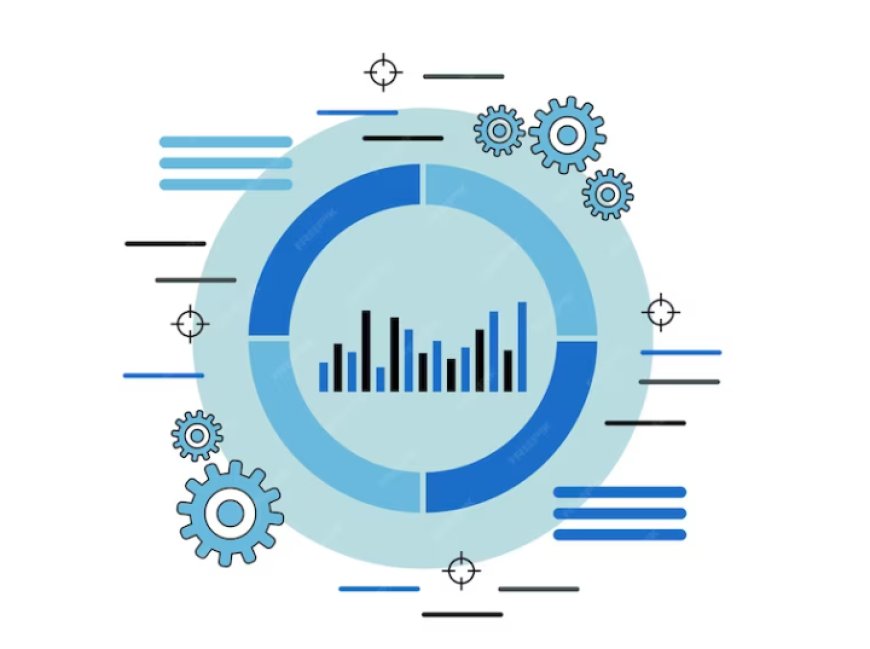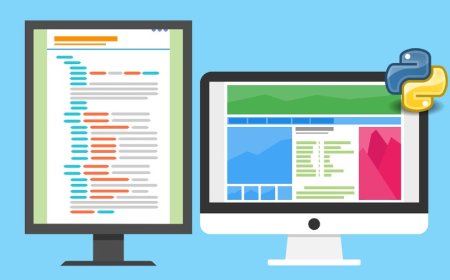The Scope Of Data Science
Explore the vast scope of data science and its applications in today's data-driven world. Learn about data analysis, machine learning, and the career opportunities in this dynamic field.

Data science, at its core, is the field that deals with extracting insights and knowledge from vast amounts of data through various techniques and technologies. Its significance in the modern world cannot be overstated. In an era characterized by an unprecedented influx of information, data science plays a pivotal role in deciphering patterns, making informed decisions, and driving innovation across diverse industries. It empowers businesses, researchers, and organizations to harness the full potential of data for better outcomes and improved understanding of complex phenomena.
Historical Evolution of Data Science
Data science has its roots in the fields of statistics and computer science. Its origins can be traced back to the mid-20th century when statisticians and mathematicians began exploring ways to analyze and extract insights from data. Early developments in data science included the creation of statistical methods and tools for data analysis, laying the foundation for what would become a distinct discipline.
Key Milestones and Technological Advancements
The evolution of data science accelerated with the advent of computers and digital technology. In the 1960s and 1970s, the development of databases and data management systems marked a significant milestone. The 1990s saw the emergence of data mining and machine learning techniques, enabling the extraction of patterns and knowledge from large datasets. The 21st century brought about the big data era, with the proliferation of data generated by the internet, sensors, and various digital devices.
Technological advancements in data storage, processing, and analytics, such as the rise of cloud computing and powerful data science libraries, have further propelled the field. Today, data science continues to evolve with the integration of artificial intelligence and deep learning, shaping its trajectory and expanding its capabilities for solving complex problems across diverse industries.
The Components of Data Science
Data science comprises several key components that work together to extract valuable insights from data. These components include data collection and acquisition, data cleaning and preprocessing, exploratory data analysis (EDA), statistical modeling and machine learning, data visualization, and data interpretation and storytelling.
-
Data Collection and Acquisition: Data science begins with the collection and acquisition of relevant data from various sources. This may involve web scraping, sensor data, databases, or any other data repositories. The quality and quantity of data collected play a crucial role in the success of a data science project.
-
Data Cleaning and Preprocessing: Raw data often contains errors, inconsistencies, and missing values. Data scientists must clean and preprocess the data to make it usable. This step involves tasks like handling missing values, removing outliers, and standardizing data formats.
-
Exploratory Data Analysis (EDA): EDA is the process of understanding and summarizing data to identify patterns, trends, and potential insights. Data visualization techniques are often used during EDA to create charts and graphs that reveal the data's characteristics.
-
Statistical Modeling and Machine Learning: After EDA, data scientists apply statistical models and machine learning algorithms to the data. This step involves selecting appropriate algorithms, and training models, and evaluating their performance. The goal is to build predictive or descriptive models that can answer specific questions or solve problems.
-
Data Visualization: Data visualization is a crucial component of data science as it helps in communicating findings effectively. Visual representations such as graphs, charts, and dashboards make complex data more understandable and accessible to stakeholders.
-
Data Interpretation and Storytelling: The final step involves interpreting the results of the analysis and crafting a narrative that explains the insights gained. Data scientists must convey their findings to non-technical audiences, making data-driven recommendations and decisions accessible and actionable.
These components of data science work in a cyclical and iterative manner, allowing data scientists to continuously refine their models and insights as they gain a deeper understanding of the data. This iterative process is at the heart of data science, enabling organizations to make data-informed decisions and drive innovation.
Data Sources and Types
Data science draws from a diverse array of data sources and types, reflecting the complexity and richness of the digital world. These data sources can be categorized into structured, semi-structured, and unstructured data.
Structured data, characterized by its organized format, includes databases, spreadsheets, and tables. This data is readily processed and analyzed, making it a cornerstone of data science applications.
Semi-structured data, on the other hand, exhibits some degree of organization but lacks a rigid structure. Examples include XML and JSON files, as well as NoSQL databases. Semi-structured data presents opportunities and challenges for data scientists due to its flexibility.
Unstructured data, which constitutes the majority of digital information, lacks a predefined structure. It encompasses text data, images, audio, video, and social media content. Extracting insights from unstructured data requires advanced techniques like Natural language processing (NLP) and computer vision, making it an exciting and evolving field within data science.
Moreover, data science also deals with specialized data types like big data, streaming data from IoT devices, and sensor data. Understanding the diverse sources and types of data is fundamental for data scientists to extract valuable insights and drive informed decisions in various domains.
Applications of Data Science
Data science finds diverse applications across various domains, driving innovation and informed decision-making.
-
Business and Finance: Data science aids in risk assessment, fraud detection, and optimizing investment strategies. It empowers businesses to make data-driven decisions, enhance customer experiences, and improve financial forecasting.
-
Healthcare and Life Sciences: Data science is pivotal in disease prediction, drug discovery, and personalized medicine. It helps analyze patient data for better treatment outcomes and manages healthcare resources efficiently.
-
Marketing and Customer Analytics: Marketers leverage data science to understand consumer behavior, create targeted campaigns, and optimize advertising spending. It maximizes ROI by tailoring marketing efforts to specific demographics and preferences.
-
Predictive Maintenance and Industrial Applications: In manufacturing and industrial sectors, data science enables predictive maintenance, reducing downtime and optimizing operations. It helps detect and address equipment failures before they occur.
-
Social Sciences and Public Policy: Data science informs public policy decisions by analyzing socioeconomic data, crime statistics, and demographic trends. It aids in resource allocation, urban planning, and social intervention strategies.
-
Sports Analytics: Data science transforms sports by analyzing player performance, predicting game outcomes, and enhancing training regimens. It provides teams and athletes with a competitive edge.
These applications illustrate the versatility and impact of data science in addressing complex challenges and driving innovation across multiple fields.
Industries Benefiting from Data Science
Data science has permeated various industries, revolutionizing the way they operate and make decisions. In retail and e-commerce, it enables personalized recommendations and demand forecasting, enhancing customer experience and optimizing inventory management. Healthcare and pharmaceuticals leverage data science for patient diagnosis, drug development, and treatment optimization, leading to more effective healthcare outcomes.
Finance and banking institutions utilize data science for fraud detection, risk assessment, and algorithmic trading, ensuring the security and stability of financial transactions. In manufacturing and supply chain, data science optimizes production processes, minimizes downtime through predictive maintenance, and streamlines logistics for more efficient operations. Additionally, the entertainment and media industry employs data science for content recommendation, audience segmentation, and content optimization to captivate and engage audiences effectively. This diverse range of industries showcases the pervasive impact and value that data science brings to various sectors of the global economy.
Data Science Tools and Technologies
In the realm of data science, a wide array of tools and technologies empower professionals to extract valuable insights from data. These tools facilitate various stages of the data science process, from data collection to analysis and visualization. Key components include programming languages like Python, R, and SQL, which serve as the foundation for data manipulation and analysis. Data analysis libraries such as Pandas and NumPy streamline data processing, while machine learning frameworks like Scikit-learn and TensorFlow enable the development of predictive models. For handling large-scale datasets, technologies like Hadoop and Spark offer robust solutions. Additionally, data visualization tools like Tableau and Matplotlib help transform complex data into meaningful visual representations, aiding in the communication of insights. These tools collectively empower data scientists to tackle diverse data challenges efficiently and effectively.
Ethical Considerations in Data Science
In the realm of data science, ethical considerations play a pivotal role in ensuring responsible and trustworthy data-driven practices. Addressing these ethical concerns is not only crucial for building public trust but also for avoiding potential harm and bias in data-driven decision-making.
Privacy and Data Security:
Protecting individuals' privacy and ensuring data security are paramount. Data scientists must adhere to strict privacy regulations and guidelines when collecting, storing, and processing sensitive information. Implementing robust encryption, access controls, and data anonymization techniques are essential to safeguard personal data.
Bias and Fairness in Algorithms:
Data and algorithms can inadvertently perpetuate bias and discrimination. Data scientists need to be vigilant in identifying and mitigating bias in their models. This involves scrutinizing training data for biases, implementing fairness-aware machine learning techniques, and continually monitoring for disparate impacts on different demographic groups.
Transparency and Accountability:
Transparency in data science processes is vital for building trust and facilitating accountability. Data scientists should document their methodologies, data sources, and model assumptions clearly. Moreover, they must be accountable for the decisions made based on their data analysis and models, especially in cases where these decisions have far-reaching consequences.
Addressing these ethical considerations not only upholds the integrity of data science but also ensures that data-driven solutions benefit society as a whole, without harming individuals or perpetuating social injustices.
Future Trends in Data Science
As data science continues its rapid evolution, several key trends are poised to shape its future landscape. Firstly, the integration of artificial intelligence (AI) and machine learning (ML) will become even more pervasive. This will lead to the development of more sophisticated models capable of handling complex and unstructured data, enabling deeper insights and predictions.
Additionally, the rise of edge computing is set to revolutionize data processing. With the increasing prevalence of IoT devices and the need for real-time analysis, the ability to process data closer to its source will become critical. This shift promises faster decision-making and reduced reliance on centralized cloud servers.
Furthermore, the ethical dimensions of data science will continue to gain prominence. Responsible data practices, including privacy protection and bias mitigation, will be integral to building trust with stakeholders. This trend reflects a broader societal awareness of the implications and responsibilities associated with harnessing large volumes of data.
The future of data science holds immense promise and potential. The convergence of AI, the advent of edge computing, and a heightened emphasis on ethical considerations are poised to drive the field forward. Staying attuned to these trends will be crucial for professionals and industries seeking to leverage the full potential of data science in the years to come.
Data science encompasses a wide array of techniques and applications that have become increasingly vital in today's world. Its scope extends across numerous industries, from healthcare to finance and beyond, where it plays a pivotal role in decision-making and problem-solving. As data science continues to evolve, it underscores the importance of ongoing innovation and the critical need for ethical considerations to ensure its responsible use and impact in the future.






























































